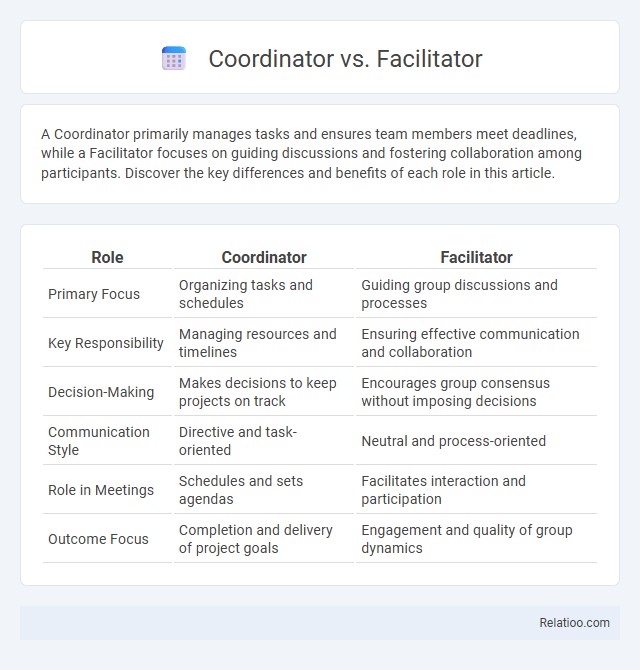A Coordinator primarily manages tasks and ensures team members meet deadlines, while a Facilitator focuses on guiding discussions and fostering collaboration among participants. Discover the key differences and benefits of each role in this article.
Table of Comparison
| Role | Coordinator | Facilitator |
|---|---|---|
| Primary Focus | Organizing tasks and schedules | Guiding group discussions and processes |
| Key Responsibility | Managing resources and timelines | Ensuring effective communication and collaboration |
| Decision-Making | Makes decisions to keep projects on track | Encourages group consensus without imposing decisions |
| Communication Style | Directive and task-oriented | Neutral and process-oriented |
| Role in Meetings | Schedules and sets agendas | Facilitates interaction and participation |
| Outcome Focus | Completion and delivery of project goals | Engagement and quality of group dynamics |
Understanding the Roles: Coordinator vs Facilitator
Understanding the roles of Coordinator vs Facilitator reveals key distinctions: a Coordinator primarily manages schedules, resources, and tasks to ensure project alignment, while a Facilitator guides group discussions, encourages participation, and helps navigate conflicts to achieve collaborative decisions. Your choice between these roles depends on whether you need structured task management or dynamic group interaction to drive outcomes effectively. Both roles are essential in teamwork, but their focus differs--Coordination emphasizes logistical execution, whereas Facilitation centers on process and communication flow.
Key Responsibilities of a Coordinator
A Coordinator primarily manages project schedules, resources, and communication to ensure timely task completion and alignment with organizational goals. Key responsibilities include organizing meetings, tracking progress, coordinating team efforts, and handling documentation related to project milestones. Your role involves balancing logistical support with effective collaboration to keep all stakeholders informed and projects on track.
Essential Duties of a Facilitator
The essential duties of a facilitator include guiding group discussions, encouraging participation, and ensuring that meetings run smoothly to achieve objectives. Unlike coordinators who focus on logistical arrangements and administrators who oversee operational tasks, facilitators prioritize managing group dynamics and fostering collaboration. Your role as a facilitator is crucial in creating an inclusive environment where all voices are heard and productive outcomes are reached.
Required Skills for Coordinators
Coordinators require strong organizational skills, effective communication, and the ability to manage multiple tasks and deadlines simultaneously to ensure projects run smoothly. Proficiency in problem-solving and conflict resolution helps coordinators address issues promptly and maintain team productivity. Additionally, coordinators should possess leadership abilities to motivate team members and coordinate resources efficiently.
Core Competencies for Facilitators
Facilitators demonstrate core competencies such as active listening, impartiality, and the ability to guide group processes smoothly, distinguishing them from coordinators who primarily manage logistics and task assignments. These competencies enable facilitators to foster collaboration, resolve conflicts, and encourage inclusive participation, essential for effective group dynamics. Unlike coordinators, facilitators emphasize process over content, ensuring that team interactions remain focused and productive.
Similarities Between Coordinators and Facilitators
Coordinators and facilitators both play crucial roles in organizing and guiding group activities to achieve specific goals, ensuring effective communication and collaboration among team members. They manage resources, streamline processes, and support problem-solving to maintain productivity and alignment within projects or meetings. Both positions require strong interpersonal skills and the ability to adapt to dynamic environments for optimal team performance.
Major Differences: Coordinator and Facilitator Explained
A Coordinator primarily manages logistics, schedules, and resources to ensure a project or event runs smoothly, whereas a Facilitator focuses on guiding group discussions and fostering collaboration to achieve consensus and productive outcomes. Your team benefits from a Coordinator's organizational skills and a Facilitator's ability to encourage participation and resolve conflicts. Understanding these distinct roles helps optimize workflow and enhances overall project effectiveness.
When to Choose a Coordinator Over a Facilitator
Choosing a coordinator over a facilitator is essential when your primary need is to manage logistical details, schedules, and resources rather than guiding group discussions or decision-making processes. Coordinators focus on organizing tasks, assigning responsibilities, and ensuring deadlines are met, which makes them ideal for projects requiring structured oversight and clear accountability. Your decision to select a coordinator should be based on the need for operational efficiency and task management rather than fostering collaboration or conflict resolution, which are core responsibilities of facilitators.
Impact on Team Dynamics: Coordinator vs Facilitator
A Coordinator structures tasks and assigns roles, enhancing team efficiency through clear organization and goal alignment, which fosters accountability and streamlined communication. In contrast, a Facilitator emphasizes guiding group discussions and encouraging collaboration, boosting team cohesion and creativity by ensuring all voices are heard and conflicts are managed constructively. Both roles impact team dynamics differently: Coordinators drive productivity and clarity, while Facilitators nurture inclusivity and collective problem-solving.
Selecting the Right Role for Your Project
Selecting the right role for your project hinges on understanding the distinct responsibilities of a coordinator, facilitator, and project manager. A coordinator primarily handles task organization and communication flow, ensuring deadlines and resources are aligned efficiently. Your choice should depend on whether your project requires structured task management, active collaboration facilitation, or comprehensive oversight to achieve optimal outcomes.

Infographic: Coordinator vs Facilitator
 relatioo.com
relatioo.com